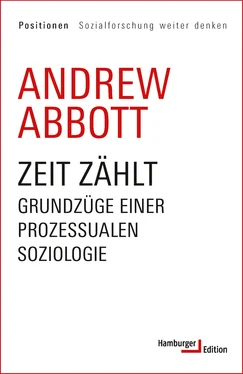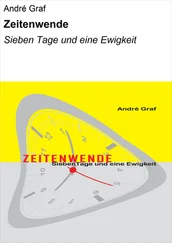99Abbott, »Things of Boundaries«; vgl. auch Arnaud Saint-Martin, »L’ontologie sociale d’Andrew Abbott«, in: Demazière/Jouvenet (Hg.), Andrew Abbott et l’heritage de l’école de Chicago . Second Volume, S. 85–104, hier S. 100.
100»Wichtig ist in diesem Zusammenhang, dass es keine Ebenen im sozialen Prozess gibt, sondern nur Ordnungen. Hierarchie zwischen Ebenen ist eine Illusion […]. Diese Konzeption von Ordnungen begräbt somit das Mikro-Makro-Problem. Es handelt sich tatsächlich nicht um ein Problem, sondern um eine relative Hierarchie in jeder konkreten Untersuchung. In einer Studie zur Demografie eines gegebenen Berufs ist der Beruf makro, und seine Vertreter sind mikro. In einer Studie zur Berufserfahrung einer bestimmten Generation verhält es sich genau umgekehrt.« (Abbott, Prozessuales Denken , S. 65.)
101Randall Collins, »Micro-Translation as a Theory-Building Strategy«, in: Karin Knorr-Cetina/Aaron V. Cicourel (Hg.), Advances in Social Theory and Methodology. Toward an Integration of Micro- and Macro-Sociologies , Boston 1981, S. 81–108; ders., »On the Microfoundations of Macrosociology«, in: The American Journal of Sociology 86 (1981), 5, S. 984–1014.
102Andrew Abbott, »L’Avenir des sciences sociales: Entre l’empirique et le normatif«, in: Annales. Histoire Sciences Sociales 71 (2016), 3, S. 577–596, hier S. 578.
103Abbott, »L’Avenir des sciences sociales«, S. 594.
104Barbara Celarent, Varieties of Social Imagination . Edited and with a Preface by Andrew Abbott, Chicago/London 2017.
105Andrew Abbott, »The Traditional Future: A Computational Theory of Library Research«, in: College & Research Libraries 69 (2008), 6, S. 524–545; ders., »L’Avenir des sciences sociales«.
106Andrew Abbott, Welcome to the University of Chicago. The Aims of Education Address (for the class of 2006) . The University of Chicago, 26. 09. 2002.
107Andrew Abbott, Comments on Pierre-Michel Menger . Innovations Conference, Northwestern University, 08. 04. 2016.
108Abbott, Chaos of Disciplines .
109Abbott, »Nach dem Chaos«, S. 285, Fn2.
110»The Shining, not the Moon. Andrew Abbott in conversation with Athanasios Karafillidis«, Soziopolis. Gesellschaft beobachten , 20. 04. 2017, https://soziopolis.de/beobachten/wissenschaft/artikel/the-shining-not-the-moon/, [18. 10. 2019].
111Abbott, »Prologue. An Autobiographical Introduction«, S. 14.
112Siehe dazu den Beitrag »Zum Begriff des Wendepunkts« in diesem Band.
113»The Shining, not the Moon. Andrew Abbott in conversation with Athanasios Karafillidis«.
114Andrew Abbott, Methods of Discovery. Heuristics for the Social Sciences , New York 2004.
115Abbott, Chaos of Disciplines , S. 17.
116Il-Tschung Lim, »Filmsoziologie als Lyrische Soziologie«, in: Alexander Geimer/Carsten Heinze/Rainer Winter (Hg.), Die Herausforderungen des Films: Soziologische Antworten , Wiesbaden 2018, S. 89–105, hier S. 92.
117Abbott, »Nach dem Chaos«, S. 286.
118Abbott, Methods of Discovery , S. 162–163; siehe dazu grundlegender auch Abbott, Chaos of Disciplines .
119Daneben erörtert Abbott die fraktalen Unterscheidungen (1) Analyse und Narration, (2) Behaviorismus und Kulturalismus, (3) Individualismus und Emergentismus, (4) Kontextualismus und Nonkontextualismus, (5) Wahl und Einschränkung, (6) Konflikt und Konsens sowie (7) transzendentes und situiertes Wissen.
120Im Grunde handelt es sich hierbei um den Normalmodus der Sozialwissenschaften, wie Tim Howard zu bedenken gibt; Tim Newton, »›New‹ Social Theory? Abbott and Social Studies of Finance«, in: Sociology 28. 1. 2019, https://doi.org/10.1177/0038038518821295[29. 06. 2020].
121Dazu zählen u.a. Suchheuristiken wie jene, in Analogien zu denken; Abbott, Methods of Discovery , S. 114. Siehe zu diesem »analogical reasoning« auch Howard S. Becker, »Reasoning from Analogy«, in: ders, What about Mozart? What about Murder? Reasoning from Cases , Chicago 2014, S. 40–60; Diane Vaughan, »Analogy, Cases, and Comparative Social Organization«, in: Richard Swedberg (Hg.), Theorizing in Social Science: The Context of Discovery , Stanford 2014, S. 61–84.
122Abbott, Methods of Discovery , S. 88–92.
123Siehe dazu den Beitrag »Lyrische Soziologie« in diesem Band.
124Abbott, Methods of Discovery , S. 168–171.
125Abbott, »From Causes to Events«.
126Athanasios Karafillidis, »Erklärungen in rekursiven Verhältnissen«, in: Zeitschrift für Theoretische Soziologie 2 (2013), 2, S. 218–238, hier S. 233.
127Siehe dazu den Beitrag »Lyrische Soziologie« in diesem Band.
128Erving Goffman, Interaktionsrituale: Über Verhalten in direkter Kommunikation , Frankfurt am Main 1986, S. 9.
129Siehe dazu den Beitrag »Lyrische Soziologie« in diesem Band.
130Siehe dazu auch Adloff/Büttner, »Die Vielfalt soziologischen Erklärens«, S. 265.
131Andrew Abbott, »Preface«, in: ders., Processual Sociology , S. IX–XVI, hier S. IX.
132Siehe dazu den »Epilog« in diesem Band.
133Abbott, »Prologue. An Autobiographical Introduction«, S. 32.
134John Dewey, Logik. Die Theorie der Forschung , Frankfurt am Main 2008, S. 127 ff.
135»The Shining, not the Moon. Andrew Abbott in conversation with Athanasios Karafillidis«.
136Abbott, »Prologue. An Autobiographical Introduction«, S. 1.
137Siehe dazu auch Fabiani, »Pour en finir avec la réalité unilinéaire«, S. 553.
138Abbott, »Epilog«, in diesem Band, hier: S. 312.
139Siehe dazu weiterführend Rainer Schützeichel, »Small Variations, Huge Differences. Über zwei Chicagoer Schulen«, in: Soziologische Revue 40 (2017), 4, S. 563–576, hier S. 571–572.
140»The Shining, not the Moon. Andrew Abbott in conversation with Athanasios Karafillidis«.
141Andrew Abbott, »Varianten der Unwissenheit«, in: David Gugerli u.a. (Hg.), Nach Feierabend: Universität , Zürich 2010, S. 15–33, hier S. 32.
142Siehe dazu den Beitrag »Epilog« in diesem Band, S. 294–314.
143Fabiani, »Pour en finir avec la réalité unilinéaire«, S. 555.
144Andrew Abbott, On Writing the Social Process . Vortrag an der Universität Bielefeld, 16. 06. 2010. Siehe dazu auch »The Shining, not the Moon. Andrew Abbott in conversation with Athanasios Karafillidis«.
145»The Shining, not the Moon. Andrew Abbott in conversation with Athanasios Karafillidis«.
146Richard Swedberg, »A Brilliant Work in General Theory. Review: Andrew Abbott, Processual Sociology«, in: Contemporary Sociology: A Journal of Reviews 46 (2017), 6, S. 640–644, hier S. 640–641. Swedberg plädiert somit – kaum verwunderlich – dafür, mehr Abstand zwischen Theorie und Methode zu bringen, als es bei den Pragmatisten, in dessen Tradition Abbott steht, für gewöhnlich üblich ist (S. 644).
147Abbott, »Preface«, S. XI.
148Ebd.
149So auch Schützeichel, »Small Variations, Huge Differences«, S. 574.
150Karafillidis, Soziale Ontogenetik , S. 8.
151Wir kommen darauf noch einmal grundlegend im Abschnitt »Zeit zählt: Abbott in der Soziologie« zurück.
152Abbott, »Nach dem Chaos«, S. 306.
153Demazière/Jouvenet, »Introduction. Andrew Abbott et sa sociologie«, S. 14, 16.
154Alan Sica, »Review: Processual Sociology by Andrew Abbott«, in: American Journal of Sociology 123 (2017), 1, S. 294–296.
155Andere Varianten des »time matters«-Arguments kamen zuvor etwa prominent von Helga Nowotny (z.B. in Time: The Modern and Postmodern Experience , Cambridge 1994), Barbara Adam (z.B. in Time , Cambridge 2004), Hartmut Rosa (z.B. in Beschleunigung. Die Veränderung der Zeitstrukturen in der Moderne , Frankfurt am Main 2005) oder in der kommunikationstheoretischen Tradition besonders von Armin Nassehi (z.B. in Die Zeit der Gesellschaft. Auf dem Weg zu einer soziologischen Theorie der Zeit , Wiesbaden 2008).
Читать дальше












